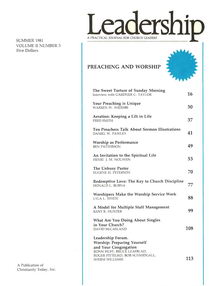The excitement of my minister friend and his wife is fresh in my memory as they told me about the great people at their new church—especially the one man who made them feel so welcome. He’d even given them a new washer and dryer at his own expense.
Equally memorable is this friend’s pain six months later as he told of the difficulty he was having in his consistory—especially with the one man who so recently had welcomed them to the parish with open arms and gifts. The problem? The gift-giver wanted things done his way!
There’s an old saying, “Beware ot those who meet you at the train.” The message for pastors is borne out by the experience of manv of their colleagues. The ones who welcome you to your new parish with gifts and glad hands may soon try to control your ministry.
To be sure, manipulation may not be a conscious intent of the giver. One minister accepted a new car from a church member, no strings attached. A few months later this generous person very nicely remarked to the pastor that he and his wife would no longer come to church if audience participation in the congregational prayers was continued. Because of the recent gift, the minister felt an extraordinary pressure to please this couple. It’s a rare person who achieves wealth or power and then gives it away without expecting to control those who receive it.
It’s a rare person who, lacking wealth, can receive a substantial gift without being controlled by the giver.
One minister I know mentioned that he took this problem so seriously, he refused a power-boat ride from a wealthy constituent although he knew the offer was well-intended. The offer was from a man with many blessings he wished to share, but the minister didn’t trust himself. He knew he might be caught up in this and want to please the giver. And this could cause him to speak, teach, or lead in a way contrary to his convictions about God’s revelation.
The reality of the adage “He who pays the pipel names the tune ” has led to strict controls in the giving of gifts to governors, senators, and presi dents. And it should make church leaders extremeh cautious in accepting gifts from individuals in thei churches.
Pastors, vulnerable in many ways, need to estac lish a code of ethics about accepting gifts. For exarr pie, a ten-dollar limit on gifts from individuals, an an announced policy that restricts all other gifts t be from the congregation as a whole. Automobile trips to the Holy Land, and other substantive gif would be proper only if clearly coming from tl entire church.
There’s a joke about a survey of sermons in a lar city. The sermons were rated on a scale from wish washy to prophetic. About those most positivt rated the surveyors quipped, “These were usua preached by clergy with an independent source income.”
Many a truth is said in jest.
Copyright © 1981 by the author or Christianity Today/Leadership Journal. Click here for reprint information on Leadership Journal.









